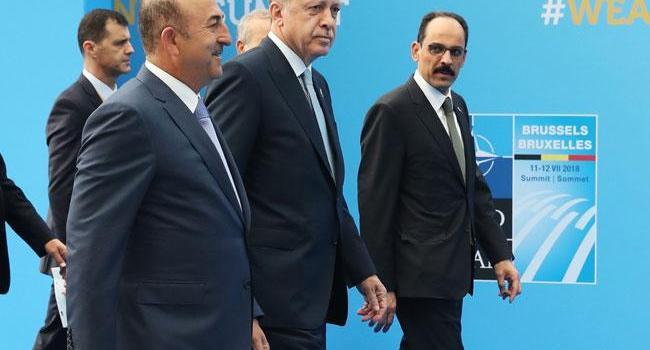Not a very easy start for Erdoğan
The outcome from the NATO Summit on July 11-12 was not bad. Perhaps Turkish President Tayyip Erdoğan could not get everything he wanted, but after all, there was no one, from United States President Donald Trump to German Chancellor Angela Merkel, to French President Emmanuel Macron, who could have everything they wanted.
The Western alliance is adopting a new strategy with Russia and China gaining power, despite no one openly speaking about it, with terrorism on the rise and at a time when the U.S. says it wanted European allies to uphold their promise in contributing to their defense.
Yet, there was a particular reference to Turkey’s concerns in the Summit Declaration. The 23rd article of the 79 article declaration on July 11 said: “Assurance measures continue to provide the fundamental baseline requirement for assurance and deterrence. In addition, tailored assurance measures for Turkey to respond to the growing security challenges from the south contribute to the security of the alliance as a whole, and will be fully implemented.”
That is an acknowledgement of Turkey’s legitimate demands on solidarity within the alliance since the declaration stated the new threat areas as follows:
1) Terrorism fuelled by the instability and crisis in the Middle East and North Africa,
2) Irregular migration and human trafficking contributed due to the same reasons,
3) The ongoing crisis in Syria, Turkey’s southern neighbor by a 910-kilometer land border.
Right before the summit, Turkish Foreign Minister Mevlüt Çavuşoğlu said the NATO collective air defense could only cover 30 percent of Turkish airspace, which is why Turkey has made the decision to buy the Russian S-400 missiles, since it had not been possible to buy the NATO-interoperable Patriot systems from Turkey’s biggest ally, the U.S. The assurance in the declaration hints to address that concern as well, and Italy’s decision to keep its Patriot battery in Turkey for another year on July 12 could be regarded as a positive sign.
Erdoğan had no separate meeting with Trump as he had signaled before, but the two had an intense chat while walking to enter the NATO headquarters in Brussels in front of cameras and other leaders, which saved the situation, together with one-on-one meetings with Merkel and Macron.
Just as Erdoğan was speaking with NATO leaders in Brussels, another decline began in the value of Turkish Lira in Istanbul financial markets. One U.S. dollar was 4.69 liras, the lowest on July 11. In the early hours of July 12, it hit a record low of 4.97 and was at 4.85 liras when the day closed at 5:00 p.m.
The decline began after the stock exchange closed at 5:00 p.m. on July 11. The reason, as experts commented, was because of a statement by Erdoğan about the economy on his way from Baku to Ankara and news reports until that hour were embargoed. In that statement, Erdoğan had said interest rates would drop when the inflation rate was lowered, which was 15.39 percent, at its 14-year high last week, and Treasury and Finance Minister Berat Albayrak would do whatever was necessary for it.
Erdoğan added that Albayrak, who is also his son-in-law, has a past in the financial sector, both in theory and in practice, and he would quickly take everything under control. The same day, one of the first decrees of the new presidential government was issued to bring new rules about the appointment of the Central Bank governor, the deputy governors, and members of the Monetary Policy Board (PPK).
Albayrak said on July 12 the government would not let the independence of the Central Bank be subject to the speculations on the market and the target would be to bring down the inflation to one-digit levels again.
This was not a very easy start for Erdoğan, but it seems he would not be deterred by that and stay determined to press for the new system he has just launched.












